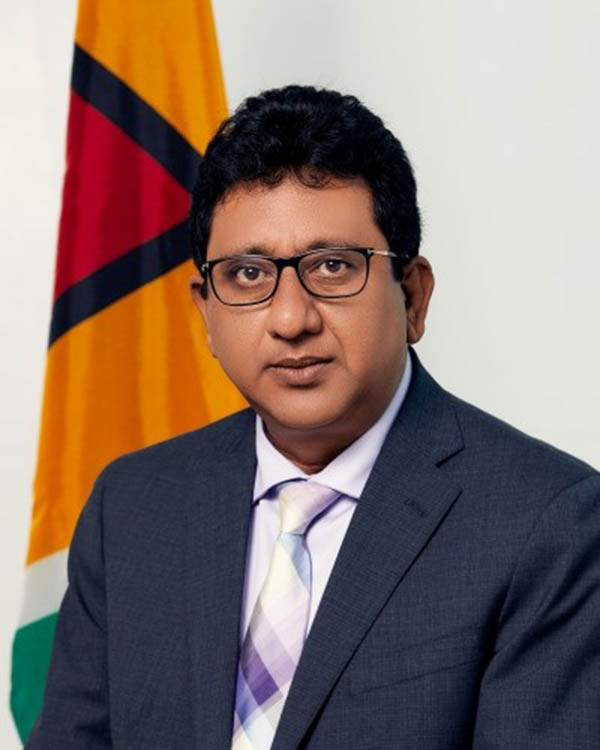Having strongly objected to the current controversial Cybercrime Act when it was in opposition, Government says that plans are in the works to have it repealed and it will be replaced by a modern Act formed out of recommendations of the United Nations Convention on Countering the Use of Information and Communication Technologies for Criminal Purposes.
“It will be a model cybercrime Bill for the CARICOM region. That Bill will meet modern international standards. It is the UN that is setting that example, so nobody can fault us. This one will be repealed,” Attorney General Anil Nandlall told Stabroek News yesterday, when contacted for an update on the issue.
“This will be repealed to provide for the modern updated Cybercrime bill, which is currently being worked on at the level of an ad hoc committee established by the United Nations,” he added.
Free speech advocates have argued that the state and private individuals are using the provisions of the act to target political and other figures. The advent of the Act has seen a number of charges including one over a statement that a Hindu pandit had consumed fish at a religious ceremony. More recently the Mayor of Georgetown Ubraj Narine and Member of Parliament Sherod Duncan were also charged over utterances they had made.
The Attorney General explained that the United Nations has established a committee to work on a convention to deal with countering the use of information and communication technologies for criminal purposes and that there is an ongoing workshop to draft this convention. Guyana, he said, will be represented at this forum.
But that resolution already has human rights organisations across the globe concerned, and Human Rights Watch (HRW) says that it, together with the Electronic Frontier Foundation and over 125 non-governmental organisations have written to the Ad Hoc Committee outlining concerns.
It has also asked the Committee “to ensure that its work includes meaningful civil society participation, and that any proposed convention on cybercrime incorporates clear and robust human rights safeguards.”
A resolution was tabled at the United Nations in November of 2019, on Countering the Use of Information and Communications Technologies for Criminal Purposes and it was put to a vote and passed. The resolution is geared at creating an “open-ended ad hoc intergovernmental committee of experts, representative of all regions, to elaborate a comprehensive international convention …”
But while Guyana is participating, it had been one of six Caricom countries that abstained from voting at the UN where there had been 88 votes for the resolution, 58 against and 30 abstentions.
“And out of this convention will come a model Cybercrime bill…Hopefully, by early next year, we should have the convention in draft. We intend to sign on to it and we will use the model legislation that will be produced as well,” Nandlall explained.
The Committee will hold its fourth session from 9- 20 January 2023 in Vienna, Austria.
Guyana will be represented by attorney at law Joann Bond.
In Caricom, Belize had voted against the resolution and Guyana, The Bahamas, Barbados, Grenada, Haiti and Trinidad & Tobago had abstained from voting.
Voting in favour were Antigua & Barbuda, Dominica, Jamaica, Suriname, Saint Vincent, Saint Kitts and Saint Lucia.
Nandlall explained that while CARICOM is adopting a coordinated position on the negotiations, countries of the region were required to ensure that their national priorities are adequately represented and ventilated.
It is in that context, that Guyana, through both the Ministry of Foreign Affairs and the Attorney General’s Chambers, has been participating in the negotiations.
This country hopes that with its own “plans to update its Cybercrime Act, the new Convention would serve as a good basis to take forward national efforts in this regard.”
“The provisions of the new Convention will address key procedural, prevention, and enforcement measures, which will provide scope for Guyana to further strengthen implementation of its Cybercrime Act, including through international cooperation,” Nandlall said.
In July of 2018, after months of objection from both the public and PPP/C which was in opposition at the time, the APNU+AFC government, used its majority to pass the contentious Cybercrime Bill with an amendment excising a controversial sedition clause. However, concerns still remained.
Former President David Granger later signed it into law.
The Cybercrime Bill became the subject of criticism after it returned to the House from a Special Select Committee in early 2018.
Concerns centred around the sedition clause in which Section 18 (1) of the bill stated that, “A person commits an offence of sedition if the person, whether in or out of Guyana, intentionally publishes, transmits or circulates by use of a computer system, a statement or words, either spoken or written, a text, video, image, sign, visible representation, or other thing, that (a) brings or attempts to bring into hatred or contempt, or excites or attempts to excite disaffection towards the Government established by law in Guyana.”
The Guyana Human Rights Association, the Working People’s Alliance and the National Toshaos Council were among the organisations that all publicly criticised the clause, arguing that it was an attempt to stifle the rights of individuals to freedom of speech.
The PPP/C had used many forums to highlight its objection to the Bill, especially the sedition aspect.
The subsection was eventually removed by way of an amendment brought by former Attorney General Basil Williams, who noted that government amended the bill based on criticisms received.






